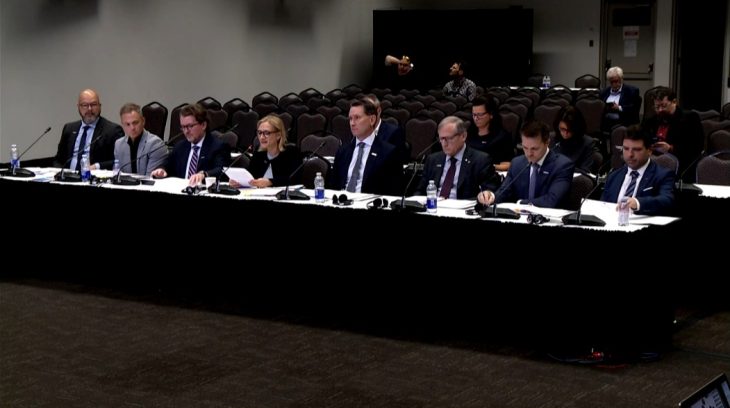
Cogeco urges easing of quotas
By Ahmad Hathout
The head of Stingray Radio said Thursday that overexposing Canadians to domestic music on radio is pushing them toward streaming services.
“Whether it’s a Canadian song they don’t like or an international song they don’t like, we risk driving them to international, foreign-owned, unregulated streamers,” Steve Jones told the commission studying the definition of Canadian content on audio services.
Jones noted that, through the company’s research and through the years, Canadian music has only captured roughly 10 per cent of consumption in Canada.
“So there is historical data that suggests that listeners have a certain threshold for Canadian music,” Jones said, adding this isn’t an indictment on Canadian music, considering Canada’s relatively small population, and that 10 per cent warrants a “victory lap.”
“I think 10 per cent, 15 per cent max is where this ultimately will end up no matter how much Canadian content we mandate because you just simply can’t overexpose people to something to force them to like it,” Jones said. “They will like what they like. If you build it, they will not come.”
This is all to say that Stingray wants the commission to forget the 35 per cent CanCon mandate and bring it down closer to 25 per cent. “We believe 25 per cent puts us in a place that allows us to better compete with international unregulated streaming companies. It allows us to present a product to audiences that is significantly more palatable,” he said. “And when combined with our recommendation to redefine what constitutes a Canadian song, that becomes even more clear that we’ll be able to present a much better product, resulting ideally in a stronger and more vibrant radio industry in Canada for years to come.
“There is a limited number of tracks to choose from that allow commercial radio to play music that we believe will be high appeal, that will allow us to grow and maintain audience,” he added. “So what inevitably happens is that radio repeats the same songs because those are the ones that listeners tell us they want to hear. The risk we take as we go further down the list of songs is that we play songs that are less popular, less desirable, less mass appeal, risking radio’s ability to hold on to its audience.”
Part of the problem for Stingray is that, according to how the regulator defines CanCon, some of the music co-written by Canadian artists – which are breaking into the U.S. Top 50 charts – don’t qualify as “Canadian” because they were co-written by non-Canadians.
Representatives from CBC/Radio Canada noted the 10 per cent CanCon consumption figure cited by Stingray and, while they didn’t have data to confirm or deny that, said that they should be striving for more than that – even if by just five per cent.
Amazon Music representatives on Thursday pointed to the platform’s use of Canadian playlists for users to get that type of content and warned against a quota mandate on streaming services.
“We think that if there was sort of interference with an algorithm and we’re having to push Canadian content in places where customers haven’t given an indication that it should be, that risks degrading the user experience, which over time is going to lower engagement,” head of Amazon Music in Canada, John Murphy, told the commission.
“And then again, the lower engagement, the less likely people are to come back and, you know, we’re in a sort of very cost sensitive time,” he added, noting the relatively thinner margins in music with a big chunk of the money paid out in royalties. “You know, music subscription on the full subscription side costs money. We don’t want people to leave the service.”
On Friday, Cogeco brought a full team, including its chairman of the board and former President and CEO head Louis Audet, to pitch the need for immediate regulatory relief because “we are sinking,” he said.
It hasn’t been a good past few weeks for Cogeco, which is being squeezed between CanCon obligations on its 21 radio stations and the need to negotiate with the largest internet service providers to ride on its cable networks using the CRTC’s wholesale internet regime.
And the frustration was palpable. In their opening remarks, Cogeco executives took turns directly blaming the regulator for putting the company in what they conveyed as a difficult position.
“Our viability is seriously threatened in large part by your actions,” Caroline Jamet, newly minted president of Cogeco Media, told the commission, adding a “fundamental change of mentality within the CRTC is absolutely necessary and long overdue.”
The Montreal-based company said the rigid quota are killing it. “More quotas will ensure that we will not survive,” Paul Cowling, the company’s chief legal and corporate affairs officer, said.
Cogeco is recommending the CRTC adopt a single 40 per cent quota for French-language music calculated monthly, the abolition of primetime, and adjusting the reference period from one week to one month, instead of weekly.
“The Commission’s inaction has already led to a massive drop in listenership and revenues for commercial radio,” added Audet. “At the same time, of the $14.3 billion in annual ads investment spent in Canada, $10 billion is now being spent with foreign mainly American digital media with undue tax and regulatory advantages,” adding the federal government advertises on foreign platforms over domestic ones.
Audet urged the CRTC to pressure the federal government to remove the tax exemption on Canadian purchases of advertising on foreign media to repatriate some of that money.
“That is the only way to bring the budgets back to Canada,” Audet said. “And given the dire state of the advertising industry in Canada … the government may have to add … income tax credits for advertising to come back.”
Screenshot of the Cogeco team on Friday, September 19, 2025



